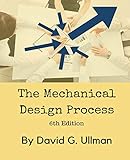The mechanical design process / David G. Ullman.
Material type: TextPublisher: Independence, Oregon : David Ullman LLC, 2018Edition: Sixth editionDescription: xii, 467 pages : illustrations ; 24 cmContent type:
TextPublisher: Independence, Oregon : David Ullman LLC, 2018Edition: Sixth editionDescription: xii, 467 pages : illustrations ; 24 cmContent type: - text
- unmediated
- volume
- 9780999357804
- 621.8 UL.M 2018 23
- TJ230 .U54 2017
| Item type | Current library | Collection | Call number | Status | Date due | Barcode | |
|---|---|---|---|---|---|---|---|
|
|
The Knowledge Hub Library | Engineering | 621.8 UL.M 2018 (Browse shelf(Opens below)) | Not For Loan | 190193 | ||
|
|
The Knowledge Hub Library | Engineering | 621.8 UL.M 2018 (Browse shelf(Opens below)) | Available | 210293 | ||
|
|
The Knowledge Hub Library | Engineering | 621.8 UL.M 2018 (Browse shelf(Opens below)) | Available | 210294 |
Includes bibliographical references and index.
Chapter 1. Introduction to the mechanical design process -- Chapter 2. Understanding mechanical design -- Chapter 3. Designers and design teams -- Chapter 4. The design process -- Chapter 5. Project definition -- Chapter 6. Product definition -- Chapter 7. Concept generation -- Chapter 8. Concept evaluation and selection -- Chapter 9. Product generation -- Chapter 10. Product evaluation for performance and the effects of variation -- Chapter 11. Design for cost, manufacture, assembly, and other measures -- Chapter 12. Wrapping up the design process and supporting the product -- Appendix A. Properties of twenty-five materials most commonly used in mechanical design -- Appendix B. Normal probability -- Appendix C. The statistical factor of safety -- Appendix D. Human factors in design.
The Mechanical Design Process combines a practical overview of the design process with case material and real-life engineering insights. Ullman's work as an innovative designer comes through consistently, and has made this book a favorite with readers. This book conveys the "flavor" of design, addressing both traditional engineering topics, as well as real-world issues like creative thinking, synthesis of ideas, visualization, teamwork, sense of customer needs and product success factors, and the financial aspects of design alternatives, in a practical and motivating manner. New in this edition are examples from industry and over twenty online templates that help students prepare complete and consistent assignments while learning the material.
There are no comments on this title.

